关于领导力教育的笔记
领导力课程笔记

1、前端免费,后端赢利 案例:携程网发卡
2、转介绍系统(内部转介绍系统)
3、资源整合策略联盟(故事:比尔盖茨女儿)
4、宣传宣传
5、傍大款策略
――想成功一定要与成功的人在一起;想成为有钱人一定要与有钱的人在一起。
二、金额(12)
加码
将你的产品或附加服务打包销售(能打包的就不要将其拆开)
三、频率(6)
――不断生产新产品,改良旧产品卖给老客户
我卖什么?我如何卖?我卖给谁?(5W2H)
谁来买――消费者是谁?
为何买――购买目的?
什么买――购买要求?
何时买――时间
何地――地点
如何买――方式
何价买――水平
竞争5W研究分析法
SWOT分析法
一、第一,唯一,另起一行
――想成为某一行业的第一名
二、舍:
1、舍得,聚焦,少则得
――沃而沃:案全 奔驰――尊贵
2、定位定天下,定位是企业的根,是企业的魂、是企业的道,定位就是等于
儒学=孔子、道家=老子、佛家=释迦牟尼
3、占领客户的心智模式永远比占领市场更重要
4、心智拒绝改变
长虹 97年 26.12亿 产业报国
2003年 2.06亿 小足空调业
2004年 -38.6亿
脑白金的广告词
4、如何让业绩几何式增长?
领导力:原价29800元――19800元(3天2晚)――现场6980元
――买3送1,买5送2
下午营销课程
企业倍增利润三个法则:
一、人数(72)
量大是任何成功致富的基础。(案例:拜年信息――中国联通)
事件营销:汶川地震 猪坚强――新希望饲料喂养的
――一流的老板在做势;二流的老板在做市;三流的老板在做事。
领导力课程笔记
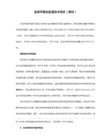
1,什么是领导力
2,提升卓越领导力的五大法则
稻盛和夫经营哲学:
敬天爱人
利他原则
卓越领导的“六个精进”:
多 付出 自省 戒骄戒躁
积善德 感恩 乐观
什么是领导力
领,就是战略,是方向是十字路口的选择
【操作思路】不怕属下犯错:即使错了,可以让属下承担责任,可以让属下认真总结,可以罚一人避免更多人重犯。
【操作思路】不怕属下犯错:即使错了,可以让属下承担责任,可以让属下认真总结,可以罚一人避免更多人重犯。
四、重步骤,不重结果
【思考问题】:为什么领导者已经事无巨细,而事事未必成功?为什么领导者盯紧每个过程,而结果却总不如人意?
开发新顾客的方法:
?1、发宣传单。
?2、电话行销。
?3、聘请业务员。
?4、登广告。
?5、做批发。
?6、在百货公司设立专柜。
?7、开产品说明会。
?8、连锁行销。9、家庭聚会。?10、电视广告。?11、杂志上宣传。?12、登报纸。?13、举办多个活动,通过公关解说产品。?14、发行录音带或出书来宣传产品。?
老板为什么累
不授权
接受反受权
插手已授权
一、 不授权
【思考问题】:为什么领导越做越累,而下属却越来越闲?为什么领导抱怨下属无能,而下属却说领导累死活该?
【关键原因】 : 1.担心属下没有自己做得好(不满意,授权下级却做不好) 2.担心授权后自己还要重做(不放心、万一搞砸了怎么办) 3.担心授权后教导起来费劲(怕麻烦,授权教导起来麻烦) .4担心自己的地位受到影响(怕威胁,授权害怕失去权力)
第二个方法:增加顾客消费的频率。
成为领导者 读书笔记

成为领导者的读书笔记一、领导力是一种技能领导力是一种技能,它可以通过学习和实践来提高。
这种技能包括:沟通、决策、规划、协调、激励、创新等方面。
这些技能不仅在个人生活中很重要,而且在工作中也同样重要。
二、领导力是一种责任领导力是一种责任,是对自己和他人的一种责任。
作为领导者,你需要对自己和你的团队负责。
你需要为团队的成功和失败承担责任,同时也需要为团队成员的成长和发展提供支持和帮助。
这种责任不仅需要你有足够的知识和技能,还需要你有良好的品德和道德。
三、领导力是一种影响力领导力是一种影响力,是通过自己的行为和言语来影响他人的能力。
作为领导者,你需要能够影响你的团队成员,让他们相信你的想法和决策是正确的,并且愿意跟随你的步伐。
这种影响力可以通过多种方式来实现,如:榜样、鼓励、支持、奖励等。
四、领导力是一种关系领导力是一种关系,是领导者与团队成员之间的一种关系。
这种关系需要建立在信任、尊重和理解的基础上。
作为领导者,你需要与团队成员建立良好的关系,了解他们的需求和想法,并且尊重他们的意见和建议。
这种关系可以帮助你更好地管理和领导团队。
五、领导力是一种变革领导力是一种变革,是通过改变和创新来推动组织发展的能力。
作为领导者,你需要能够看到未来的趋势和发展方向,并且能够引领团队进行变革和创新。
这种变革不仅需要你有足够的勇气和决心,还需要你有足够的知识和技能来推动变革的实现。
总之,《成为领导者》这本书让我深刻地认识到了领导力的含义和重要性。
它让我明白,领导力不仅是一种技能和能力,更是一种责任和使命。
它需要我们不断地学习和实践,不断地提高自己的能力和素质。
同时,它也需要我们与他人建立良好的关系,通过合作和创新来实现共同的目标和价值。
超强领导力读书笔记摘抄

超强领导力读书笔记摘抄在阅读关于超强领导力的书籍时,我深受启发,以下是我从中摘抄的一些关键点,它们不仅为我提供了领导力的深刻见解,也指引我在实际工作中如何更好地发挥领导作用。
首先,领导力并非天生,而是可以通过学习和实践来培养的。
书中强调,每个人都具备成为优秀领导者的潜质,关键在于是否愿意投入时间和精力去发展这项技能。
领导者需要具备清晰的愿景,能够激励团队成员朝着共同的目标努力。
其次,领导者必须具备出色的沟通能力。
有效的沟通不仅仅是传达信息,更重要的是倾听团队成员的声音,理解他们的需求和期望。
通过开放和诚实的对话,领导者能够建立信任,这是团队凝聚力和执行力的基础。
此外,领导者需要展现出卓越的决策能力。
在面对复杂多变的情况时,领导者必须能够迅速做出明智的决策,并承担相应的后果。
这要求领导者具备良好的判断力和风险评估能力。
书中还提到,领导者应该具备适应性和灵活性。
在不断变化的环境中,领导者需要能够调整策略和方法,以应对新的挑战。
这种适应性不仅体现在战略层面,也体现在日常管理中,领导者需要能够灵活地处理各种突发情况。
激励团队也是领导力的重要组成部分。
优秀的领导者懂得如何激发团队成员的潜力,通过正面的反馈和认可来增强团队的士气和动力。
同时,领导者也应该关注团队成员的个人成长和发展,为他们提供学习和进步的机会。
最后,领导者需要展现出道德勇气和责任感。
在面对困难和挑战时,领导者应该坚持正确的原则,即使这可能会带来短期的不便或损失。
领导者的行为和决策应该以团队和组织的长远利益为出发点。
通过这些摘抄,我更加明白了领导力的多维度和复杂性。
在实际工作中,我将努力将这些理念付诸实践,不断提升自己的领导能力,以更好地引导团队实现目标。
《领导力21法则》读书笔记
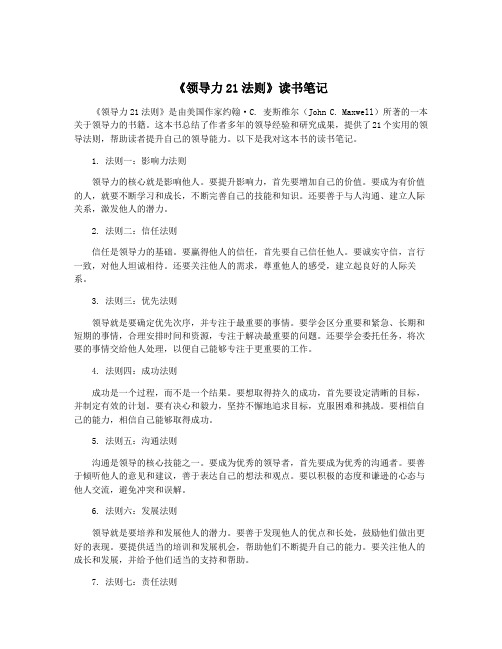
《领导力21法则》读书笔记《领导力21法则》是由美国作家约翰·C. 麦斯维尔(John C. Maxwell)所著的一本关于领导力的书籍。
这本书总结了作者多年的领导经验和研究成果,提供了21个实用的领导法则,帮助读者提升自己的领导能力。
以下是我对这本书的读书笔记。
1. 法则一:影响力法则领导力的核心就是影响他人。
要提升影响力,首先要增加自己的价值。
要成为有价值的人,就要不断学习和成长,不断完善自己的技能和知识。
还要善于与人沟通、建立人际关系,激发他人的潜力。
2. 法则二:信任法则信任是领导力的基础。
要赢得他人的信任,首先要自己信任他人。
要诚实守信,言行一致,对他人坦诚相待。
还要关注他人的需求,尊重他人的感受,建立起良好的人际关系。
3. 法则三:优先法则领导就是要确定优先次序,并专注于最重要的事情。
要学会区分重要和紧急、长期和短期的事情,合理安排时间和资源,专注于解决最重要的问题。
还要学会委托任务,将次要的事情交给他人处理,以便自己能够专注于更重要的工作。
4. 法则四:成功法则成功是一个过程,而不是一个结果。
要想取得持久的成功,首先要设定清晰的目标,并制定有效的计划。
要有决心和毅力,坚持不懈地追求目标,克服困难和挑战。
要相信自己的能力,相信自己能够取得成功。
5. 法则五:沟通法则沟通是领导的核心技能之一。
要成为优秀的领导者,首先要成为优秀的沟通者。
要善于倾听他人的意见和建议,善于表达自己的想法和观点。
要以积极的态度和谦逊的心态与他人交流,避免冲突和误解。
6. 法则六:发展法则领导就是要培养和发展他人的潜力。
要善于发现他人的优点和长处,鼓励他们做出更好的表现。
要提供适当的培训和发展机会,帮助他们不断提升自己的能力。
要关注他人的成长和发展,并给予他们适当的支持和帮助。
7. 法则七:责任法则领导就是要承担责任。
要有责任感,对自己的行为和决策负责。
要坦然接受自己的错误和失误,并从中吸取教训。
要鼓励他人主动承担责任,激发他们的积极性和创造力。
领 导力读书笔记

领导力读书笔记在当今竞争激烈的社会中,领导力成为了一个备受关注的话题。
无论是在企业管理、政府机构还是社会组织中,优秀的领导力都能够引领团队走向成功。
最近,我读了几本关于领导力的书籍,深受启发,也有了一些自己的思考和感悟。
一、领导力的定义与重要性领导力,简单来说,就是影响他人、带领团队实现共同目标的能力。
它不仅仅是职位赋予的权力,更是一种能够激发团队成员潜能、营造积极氛围、做出明智决策的影响力。
一个具有卓越领导力的人,能够在复杂多变的环境中,清晰地指明方向,让团队成员明确目标和使命。
他们能够凝聚人心,使团队成员紧密合作,共同克服困难。
同时,优秀的领导者还能够激发创新,推动组织不断发展和进步。
在企业中,领导力的重要性不言而喻。
一个好的领导者可以带领企业在市场竞争中脱颖而出,实现业绩的持续增长。
在政府部门,领导力能够促进政策的有效实施,提升公共服务的质量,造福社会大众。
二、领导力的核心特质通过阅读,我发现优秀的领导者通常具备以下几个核心特质:1、愿景与目标设定能力领导者要有清晰的愿景和明确的目标。
他们能够看到未来的发展趋势,为组织描绘出一个令人向往的蓝图,并将其转化为具体、可衡量的目标。
这样可以让团队成员明白努力的方向,激发他们的积极性和创造力。
2、沟通与倾听能力良好的沟通是领导力的关键。
领导者要能够清晰、准确地表达自己的想法和期望,同时也要善于倾听团队成员的意见和建议。
通过积极的沟通和倾听,领导者可以建立起信任,增强团队的凝聚力。
3、决策能力在面对各种复杂的情况和问题时,领导者需要迅速做出明智的决策。
他们能够收集和分析信息,权衡利弊,果断地采取行动。
同时,他们也要敢于承担决策带来的风险和责任。
4、团队建设能力领导者要善于选拔和培养人才,打造一个高效的团队。
他们能够根据团队成员的特点和优势,合理分配工作任务,激发每个人的潜能。
同时,领导者还要注重团队文化的建设,营造一个积极、和谐的工作氛围。
5、自我管理能力优秀的领导者懂得自我约束和自我激励。
《领导力21法则》读书笔记
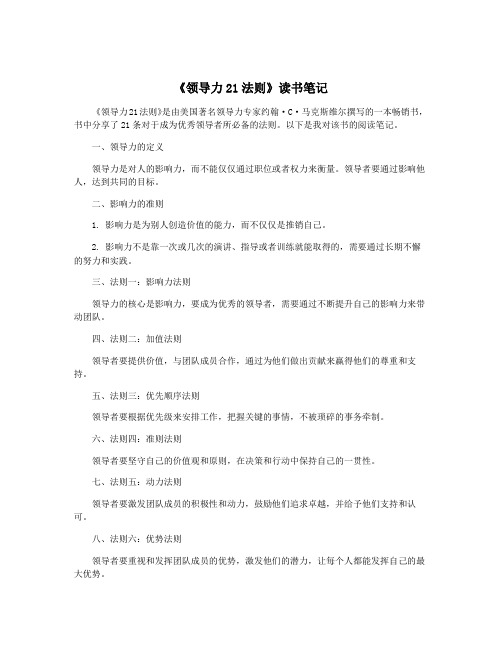
《领导力21法则》读书笔记《领导力21法则》是由美国著名领导力专家约翰·C·马克斯维尔撰写的一本畅销书,书中分享了21条对于成为优秀领导者所必备的法则。
以下是我对该书的阅读笔记。
一、领导力的定义领导力是对人的影响力,而不能仅仅通过职位或者权力来衡量。
领导者要通过影响他人,达到共同的目标。
二、影响力的准则1. 影响力是为别人创造价值的能力,而不仅仅是推销自己。
2. 影响力不是靠一次或几次的演讲、指导或者训练就能取得的,需要通过长期不懈的努力和实践。
三、法则一:影响力法则领导力的核心是影响力,要成为优秀的领导者,需要通过不断提升自己的影响力来带动团队。
四、法则二:加值法则领导者要提供价值,与团队成员合作,通过为他们做出贡献来赢得他们的尊重和支持。
五、法则三:优先顺序法则领导者要根据优先级来安排工作,把握关键的事情,不被琐碎的事务牵制。
六、法则四:准则法则领导者要坚守自己的价值观和原则,在决策和行动中保持自己的一贯性。
七、法则五:动力法则领导者要激发团队成员的积极性和动力,鼓励他们追求卓越,并给予他们支持和认可。
八、法则六:优势法则领导者要重视和发挥团队成员的优势,激发他们的潜力,让每个人都能发挥自己的最大优势。
九、法则七:人际关系法则领导者要建立良好的人际关系,注重沟通和合作,培养团队共同的目标和价值观。
十、法则八:集中法则领导者要集中注意力,专注于当下的任务和目标,不被其他事物分散注意力。
十一、法则九:团队法则领导者要构建强大的团队,懂得互补的原则,发挥每个团队成员的优势,实现共同的目标。
十二、法则十:成长法则领导者要持续学习和成长,不断提升自己的能力、知识和经验。
十五、法则十三:沟通法则领导者要善于沟通,注重倾听和理解,建立良好的沟通渠道和氛围。
十六、法则十四:规划法则领导者要有明确的目标和规划,制定详细的计划和步骤,为团队成员提供方向和引导。
十七、法则十五:信任法则领导者要建立信任,与团队成员建立良好的关系,充分信任他们的能力和判断。
《领导力21法则》读书笔记
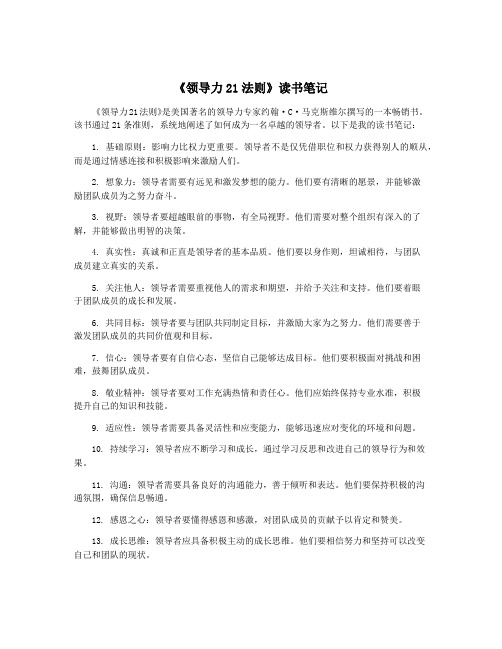
《领导力21法则》读书笔记《领导力21法则》是美国著名的领导力专家约翰·C·马克斯维尔撰写的一本畅销书。
该书通过21条准则,系统地阐述了如何成为一名卓越的领导者。
以下是我的读书笔记:1. 基础原则:影响力比权力更重要。
领导者不是仅凭借职位和权力获得别人的顺从,而是通过情感连接和积极影响来激励人们。
2. 想象力:领导者需要有远见和激发梦想的能力。
他们要有清晰的愿景,并能够激励团队成员为之努力奋斗。
3. 视野:领导者要超越眼前的事物,有全局视野。
他们需要对整个组织有深入的了解,并能够做出明智的决策。
4. 真实性:真诚和正直是领导者的基本品质。
他们要以身作则,坦诚相待,与团队成员建立真实的关系。
5. 关注他人:领导者需要重视他人的需求和期望,并给予关注和支持。
他们要着眼于团队成员的成长和发展。
6. 共同目标:领导者要与团队共同制定目标,并激励大家为之努力。
他们需要善于激发团队成员的共同价值观和目标。
7. 信心:领导者要有自信心态,坚信自己能够达成目标。
他们要积极面对挑战和困难,鼓舞团队成员。
8. 敬业精神:领导者要对工作充满热情和责任心。
他们应始终保持专业水准,积极提升自己的知识和技能。
9. 适应性:领导者需要具备灵活性和应变能力,能够迅速应对变化的环境和问题。
10. 持续学习:领导者应不断学习和成长,通过学习反思和改进自己的领导行为和效果。
11. 沟通:领导者需要具备良好的沟通能力,善于倾听和表达。
他们要保持积极的沟通氛围,确保信息畅通。
12. 感恩之心:领导者要懂得感恩和感激,对团队成员的贡献予以肯定和赞美。
13. 成长思维:领导者应具备积极主动的成长思维。
他们要相信努力和坚持可以改变自己和团队的现状。
14. 团队合作:领导者要善于组建和发展高效的团队。
他们应根据团队成员的特长和能力进行合理分配,并鼓励大家合作共赢。
15. 委托和授权:领导者要学会委托和授权,给予团队成员更多的自主权和责任。
领导力读书笔记(5篇材料)

领导力读书笔记(5篇材料)第一篇:领导力读书笔记读书笔记“领导”,既可以做动词也可以做名词,作动词时领导是一个职能,可以促进合作,实现组织目标等等功能,当然如果领导不当也能带来负面效果。
做名词则代表一个人,领导者,这个人在组织中起着关键性的作用。
领导者拥有权力,但同时也拥有巨大的责任,无论是企业领导,或者是组织,党派领导等,都肩负着巨大的责任,管理学上面提到,领导者要正确履行职责,否则就是失职,因此,领导的职责比职权的意义更为重要。
权力是把双刃剑,贪污腐败的情况在各国都有,而且大多数都是发生在某企业事业单位的领导身上,这就证明了,领导者需要控制个人欲望。
领导的过程是与下属之间互相影响的格局,领导谋求的应该是一种双赢的结局,在这点我更加赞同魅力型领导,用魅力与气质去影响下属的行为,而不是强制的对下属施加影响,实践证明,试图通过强制或者惧怕来施加影响的领导者最终总是要遇到问题。
领导不仅仅是在一个方面有强大的个人知识与能力,同时也要有强大的人际关系协调能力,领导需要善于利用自己的权力,如奖赏权,强制权等等来影响下属的行为,当然这两个相辅相成的权力需要合理利用,才能达到用人的最优化。
当然领导个人权力可能与职位有关,也可能与职位无关,所以一个领导并不一定需要懂得行业的太多知识,如阿里巴巴的马云。
从魅力型领导原理来看,我觉得它的十二种特质是很重要的,特别是善于激励他人,富有远见,强烈的集体责任感,成熟的知识,自觉意识,魅力型领导理论尚属初创阶段,但是将会日益引起人们的注意。
总之,如何做好一个成功的领导者是一门艺术,需要我们在实践中不断去总结,同时认真的学习领导理论。
第二篇:领导力读书笔记关注人,而不是产品。
看一个人能否做一个好的领导者,我关注的不是头衔,而是行动——具有强大的感召力、能使别人关注当下的核心问题,领导者要做好工作,最首要的就是必须确定他身边的人头脑清醒并关注相同的问题。
作为领导者,你必须任用那些渴望不断发展、乐于接受挑战、每天都有新进步的人。
《领导力》读书笔记

《领导力》读书笔记第一部分:领导者的角色定位-明确的主人意识领导者身上有一样特质,把他们和管理者区分开,这就是强烈的主人意识。
把自己定位成所有者,就意味着你从接手的第一天起,就要抱定对这份事业终身负责的态度。
一旦抱定终身负责的决心,领导者就需要站在十年、甚至几十年的时间尺度上,重新思考价值,定义目标。
首先是目标。
既然对一份事业终身负责,就意味着你追求的不再是短期利益,而是长期的持续成功。
长远的目标意识,也直接决定领导者的行为方式。
其次是共识,管理者注重控制行为,而领导者注重凝聚共识。
怎么凝聚共识?首先是建立不同的观测维度,弄清楚团队成员特性,按照各自的特点,用劝说、鼓励、激将法等等不同的手段,让成员产生对成功的渴望。
最后是是面向未知。
作为管理者,需要按照正确的规章制度来管理团队,而一旦作为所有者,就必须自己制定规则,因为照搬别人的模板,充其量只是模仿,无法真正走向伟大。
换句话说,管理者面向已知,按照已有的规定来管理公司,而领导者面向未知,他们要自己制定规则,寻找路径,并且带领团队前往未知的新领域。
第二部分:领导者的核心原则-始终如一始终如一分成两条:第一,在新技术、新帮手面前,保持清醒,做自己;第二,在对手面前,在竞争当中,保持冷静,做自己。
在推力和阻力、在帮手和对手之间,保持自我定义的能力,成为你自己。
第三部分:领导力的商业应用优秀的领导者,始终都具备清晰的自我定义的能力。
他们根据自己的原则来定义产品,定义目标,然后以自我需求为中心,获取外界的资源和知识,而不是盲从行业趋势。
所以他们的公司,往往都是自我的综合体现,是内在人格的最大外化,例如乔布斯“改变世界”的苹果,拉里佩奇“开源分享”的谷歌,拉里埃里森“野心勃勃”的甲骨文一样。
我们一直都以为,越是竞争激烈的领域,就越是要咬住对手,但其实恰恰相反,盯住对手反而会使我们迷失在竞争当中,忘记自己的目标。
没有一个企业是通过盯住对手,根据对手的行动作出反应而走向伟大的。
领导力读书笔记(精选3篇)
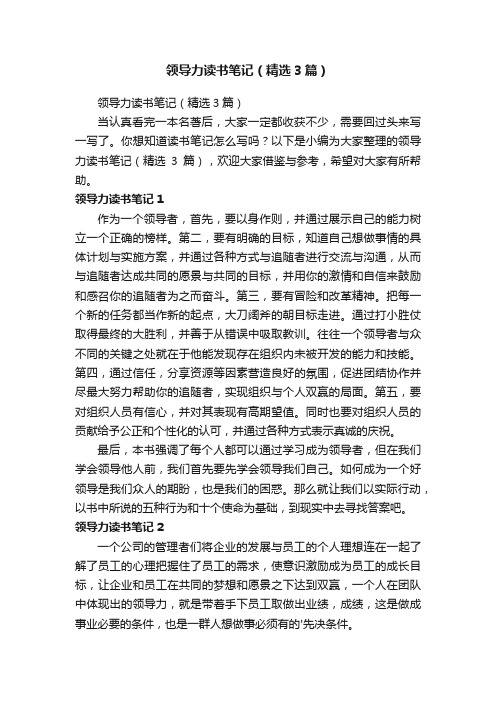
领导力读书笔记(精选3篇)领导力读书笔记(精选3篇)当认真看完一本名著后,大家一定都收获不少,需要回过头来写一写了。
你想知道读书笔记怎么写吗?以下是小编为大家整理的领导力读书笔记(精选3篇),欢迎大家借鉴与参考,希望对大家有所帮助。
领导力读书笔记1作为一个领导者,首先,要以身作则,并通过展示自己的能力树立一个正确的榜样。
第二,要有明确的目标,知道自己想做事情的具体计划与实施方案,并通过各种方式与追随者进行交流与沟通,从而与追随者达成共同的愿景与共同的目标,并用你的激情和自信来鼓励和感召你的追随者为之而奋斗。
第三,要有冒险和改革精神。
把每一个新的任务都当作新的起点,大刀阔斧的朝目标走进。
通过打小胜仗取得最终的大胜利,并善于从错误中吸取教训。
往往一个领导者与众不同的关键之处就在于他能发现存在组织内未被开发的能力和技能。
第四,通过信任,分享资源等因素营造良好的氛围,促进团结协作并尽最大努力帮助你的追随者,实现组织与个人双赢的局面。
第五,要对组织人员有信心,并对其表现有高期望值。
同时也要对组织人员的贡献给予公正和个性化的认可,并通过各种方式表示真诚的庆祝。
最后,本书强调了每个人都可以通过学习成为领导者,但在我们学会领导他人前,我们首先要先学会领导我们自己。
如何成为一个好领导是我们众人的期盼,也是我们的困惑。
那么就让我们以实际行动,以书中所说的五种行为和十个使命为基础,到现实中去寻找答案吧。
领导力读书笔记2一个公司的管理者们将企业的发展与员工的个人理想连在一起了解了员工的心理把握住了员工的需求,使意识激励成为员工的成长目标,让企业和员工在共同的梦想和愿景之下达到双赢,一个人在团队中体现出的领导力,就是带着手下员工取做出业绩,成绩,这是做成事业必要的条件,也是一群人想做事必须有的'先决条件。
一个企业想要把事业做大,做好,做到一定程度,就必须要依靠一直良好的团队来运作,而团队要想良性且迅速地成长就需要好的带头人,这个好的带头人一定要具备强大的领导能力,能够给整改团队打造梦想,让团队成员为了一个目标而执着地区努力奋斗。
润泽园道即是领导力笔记

润泽园道即是领导力笔记导言:领导力是企业和组织中非常重要的概念,它关乎企业的发展和成功。
润泽园道即是领导力的重要笔记,园道包含了许多有关领导力的精华。
在这份笔记中,我将从润泽园道中摘录一些关键的领导力观点,并谈论其在实际工作中的应用。
一、润泽园道对领导者的要求1.自律和自省:领导者应具备自律和自省的能力。
自律是指领导者对自己设定目标,并持续努力去实现这些目标的能力。
自省是指领导者反思自己的行为和做事方式,以寻求改进并不断成长。
2.品德高尚:领导者应具备高尚的品德,包括诚实、正直、公正、善良等。
这些品德将赢得员工的尊敬和信任,并带领团队朝着正确的方向前进。
3.激励和鼓舞:领导者应具备激励和鼓舞团队的能力。
他们应该能够发现员工的潜力,并通过激励和鼓励帮助他们实现自己的目标和梦想。
二、润泽园道对领导者的建议1.学习和成长:领导者应始终保持学习的状态,并持续不断地提升自己的专业知识和技能。
只有不断学习和成长,才能适应不断变化的环境,并为企业和团队带来更多机遇和挑战。
2.倾听和沟通:领导者应懂得倾听他人的意见和建议,并善于沟通。
倾听他人能够帮助领导者更好地了解团队的需求和问题,并找到解决的方法。
而良好的沟通能力则是领导者与团队沟通的桥梁,能够促进合作和协调。
3.信任和赋权:领导者应相信团队成员的能力,并给予他们足够的信任和赋权。
通过信任和赋权,领导者能够激发团队成员的积极性和创造力,使其充分发挥自己的潜力。
三、润泽园道的领导者的角色模型1.导航者:领导者应成为组织的导航者,为团队设定明确的目标,并为实现这些目标提供指导和支持。
2.教练:领导者应成为团队的教练,帮助团队成员发现自己的潜力,并提供必要的培训和指导,使其能够不断成长和进步。
3.服务者:领导者应成为团队的服务者,关注员工的需求和利益,并为其创造一个良好的工作环境和发展机会。
四、润泽园道的领导力应用案例1.激励员工:领导者通过激励员工发挥其潜力,提高工作的积极性和效率。
领 导力读书笔记

领导力读书笔记在阅读了关于领导力的相关书籍后,我深受启发,对领导力有了更深入的理解和思考。
领导力并非是一种与生俱来的天赋,而是可以通过后天的学习和实践不断培养和提升的能力。
它不仅仅是指在高位上指挥他人的权力,更是一种能够影响和引导他人,共同实现目标的能力。
优秀的领导者往往具备清晰的目标设定能力。
他们能够明确地知道自己想要带领团队走向何方,并且能够将这个大目标分解为一个个具体、可衡量、可实现、相关联且有时限的小目标。
这使得团队成员能够清晰地理解自己的工作方向和重点,从而提高工作效率和质量。
同时,良好的沟通能力也是领导力的关键要素之一。
领导者需要能够倾听团队成员的意见和想法,理解他们的需求和困扰。
在传达自己的想法和决策时,能够做到清晰、准确、简洁,避免产生歧义。
有效的沟通能够增强团队成员之间的信任,提高团队的凝聚力和协作能力。
决策能力对于领导者来说至关重要。
在面对复杂的情况和众多的选择时,领导者需要迅速做出明智的决策。
这不仅需要对问题有深入的分析和理解,还需要有勇气承担决策带来的后果。
而且,决策过程中要充分考虑各种因素,权衡利弊,以确保决策的合理性和有效性。
领导者还需要有强大的自我管理能力。
他们要能够控制自己的情绪,保持冷静和理智,在压力下做出正确的判断。
同时,要不断地自我学习和自我提升,以适应不断变化的环境和挑战。
一个能够自我管理的领导者,往往能够成为团队成员的榜样,激励他们也不断进步。
另外,领导者要有激励团队的能力。
他们要善于发现团队成员的优点和潜力,给予及时的肯定和鼓励,让成员们感受到自己的价值和重要性。
通过设定合理的奖励机制,激发团队成员的积极性和创造力,使整个团队充满活力和斗志。
在实际的工作场景中,我曾遇到过一位出色的领导者。
他在带领我们完成一个重要项目时,充分展现了卓越的领导力。
项目初期,他明确地向我们阐述了项目的目标和意义,让我们每个人都清楚地知道自己的工作对于整个项目的重要性。
在项目进行过程中,他经常与我们交流,倾听我们的想法和困难,并给予切实可行的建议和支持。
《领导力21法则》读书笔记

《领导力21法则》读书笔记《领导力21法则》是约翰·C·马克斯威尔所著的一本有关领导力的书籍。
这本书中,作者总结了自己多年来的领导经验,提出了21条领导力法则,帮助读者更好地理解和应用领导力。
以下是我对这本书的一些读书笔记:1. 《领导力21法则》第一法则为“法则一:激发潜力。
”这一法则强调领导者应该发现并激发团队成员的潜力,使他们能够充分发挥自己的能力。
作者认为,一个优秀的领导者应该能够看到每个人的独特之处,并帮助他们发现并发展自己的才能。
2. 《领导力21法则》第二法则为“法则二:行为说明一切。
”这一法则强调领导者的行为对于团队的重要性。
作者认为,领导者的行为会对团队产生深远的影响,因此领导者应该时刻保持良好的行为示范,树立榜样。
3. 《领导力21法则》第三法则为“法则三:人际关系杀手。
”这一法则强调团队合作的重要性。
作者指出,一个良好的团队合作是一个领导者成功的关键,领导者应该注重建立和谐的人际关系,消除团队内的冲突,提高团队的效率。
4. 《领导力21法则》第四法则为“法则四:善于倾听。
”这一法则强调领导者应该善于倾听他人的意见和建议。
作者认为,一个好的领导者应该有开放的心态,能够倾听他人的观点,从不同的角度看待问题,以便做出更好的决策。
5. 《领导力21法则》第五法则为“法则五:早思早为。
”这一法则强调领导者应该具备一定的前瞻性和预判能力。
作者认为,一个成功的领导者应该能够提前预测未来的市场和环境变化,及时调整自己的战略和决策,以应对不断变化的挑战。
6. 《领导力21法则》第六法则为“法则六:严于律己。
”这一法则强调领导者应该对自己要求更高,严格要求自己的行为和作风。
作者认为,一个优秀的领导者应该以身作则,率先垂范,只有自己能够严格要求自己,才能得到团队的尊重和信任。
读完《领导力21法则》后,我对领导力有了更深入的理解。
这本书的每个法则都很精炼,但都包含着丰富的领导经验和智慧。
《领导力21法则》读书笔记
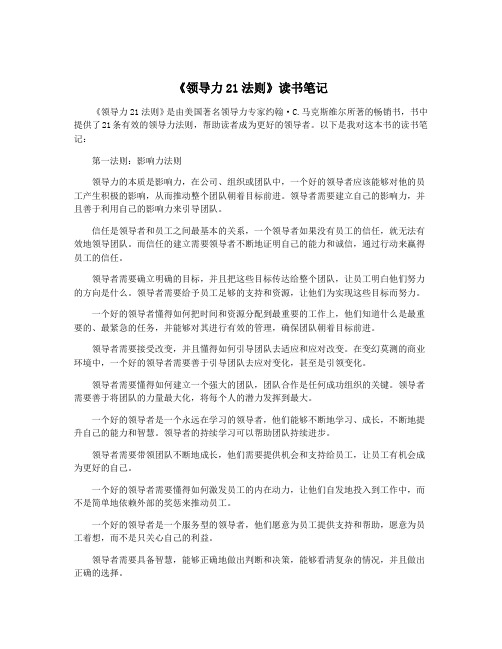
《领导力21法则》读书笔记《领导力21法则》是由美国著名领导力专家约翰·C.马克斯维尔所著的畅销书,书中提供了21条有效的领导力法则,帮助读者成为更好的领导者。
以下是我对这本书的读书笔记:第一法则:影响力法则领导力的本质是影响力,在公司、组织或团队中,一个好的领导者应该能够对他的员工产生积极的影响,从而推动整个团队朝着目标前进。
领导者需要建立自己的影响力,并且善于利用自己的影响力来引导团队。
信任是领导者和员工之间最基本的关系,一个领导者如果没有员工的信任,就无法有效地领导团队。
而信任的建立需要领导者不断地证明自己的能力和诚信,通过行动来赢得员工的信任。
领导者需要确立明确的目标,并且把这些目标传达给整个团队,让员工明白他们努力的方向是什么。
领导者需要给予员工足够的支持和资源,让他们为实现这些目标而努力。
一个好的领导者懂得如何把时间和资源分配到最重要的工作上,他们知道什么是最重要的、最紧急的任务,并能够对其进行有效的管理,确保团队朝着目标前进。
领导者需要接受改变,并且懂得如何引导团队去适应和应对改变。
在变幻莫测的商业环境中,一个好的领导者需要善于引导团队去应对变化,甚至是引领变化。
领导者需要懂得如何建立一个强大的团队,团队合作是任何成功组织的关键。
领导者需要善于将团队的力量最大化,将每个人的潜力发挥到最大。
一个好的领导者是一个永远在学习的领导者,他们能够不断地学习、成长,不断地提升自己的能力和智慧。
领导者的持续学习可以帮助团队持续进步。
领导者需要带领团队不断地成长,他们需要提供机会和支持给员工,让员工有机会成为更好的自己。
一个好的领导者需要懂得如何激发员工的内在动力,让他们自发地投入到工作中,而不是简单地依赖外部的奖惩来推动员工。
一个好的领导者是一个服务型的领导者,他们愿意为员工提供支持和帮助,愿意为员工着想,而不是只关心自己的利益。
领导者需要具备智慧,能够正确地做出判断和决策,能够看清复杂的情况,并且做出正确的选择。
《领导力21法则》读书笔记
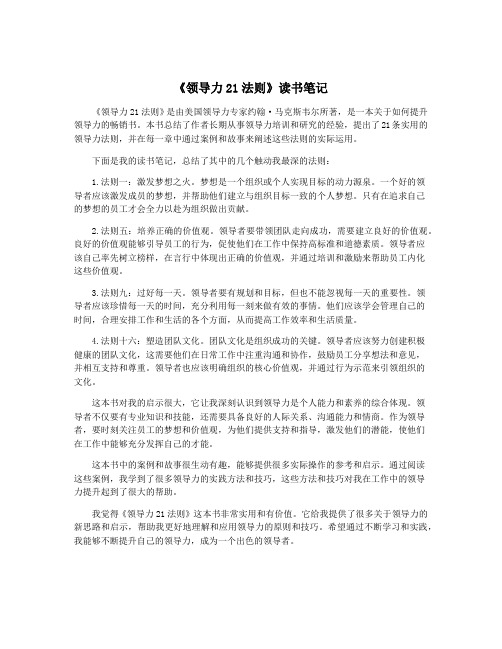
《领导力21法则》读书笔记《领导力21法则》是由美国领导力专家约翰·马克斯韦尔所著,是一本关于如何提升领导力的畅销书。
本书总结了作者长期从事领导力培训和研究的经验,提出了21条实用的领导力法则,并在每一章中通过案例和故事来阐述这些法则的实际运用。
下面是我的读书笔记,总结了其中的几个触动我最深的法则:1.法则一:激发梦想之火。
梦想是一个组织或个人实现目标的动力源泉。
一个好的领导者应该激发成员的梦想,并帮助他们建立与组织目标一致的个人梦想。
只有在追求自己的梦想的员工才会全力以赴为组织做出贡献。
2.法则五:培养正确的价值观。
领导者要带领团队走向成功,需要建立良好的价值观。
良好的价值观能够引导员工的行为,促使他们在工作中保持高标准和道德素质。
领导者应该自己率先树立榜样,在言行中体现出正确的价值观,并通过培训和激励来帮助员工内化这些价值观。
3.法则九:过好每一天。
领导者要有规划和目标,但也不能忽视每一天的重要性。
领导者应该珍惜每一天的时间,充分利用每一刻来做有效的事情。
他们应该学会管理自己的时间,合理安排工作和生活的各个方面,从而提高工作效率和生活质量。
4.法则十六:塑造团队文化。
团队文化是组织成功的关键。
领导者应该努力创建积极健康的团队文化,这需要他们在日常工作中注重沟通和协作,鼓励员工分享想法和意见,并相互支持和尊重。
领导者也应该明确组织的核心价值观,并通过行为示范来引领组织的文化。
这本书对我的启示很大,它让我深刻认识到领导力是个人能力和素养的综合体现。
领导者不仅要有专业知识和技能,还需要具备良好的人际关系、沟通能力和情商。
作为领导者,要时刻关注员工的梦想和价值观,为他们提供支持和指导,激发他们的潜能,使他们在工作中能够充分发挥自己的才能。
这本书中的案例和故事很生动有趣,能够提供很多实际操作的参考和启示。
通过阅读这些案例,我学到了很多领导力的实践方法和技巧,这些方法和技巧对我在工作中的领导力提升起到了很大的帮助。
十年领导力笔记(四)如何养成自己的权威

十年领导力笔记(四)如何养成自己的权威1、保持距离。
处于中层管理职位阶段,尚可与团队成员称兄道弟,往往也能较好的凝聚人心。
再往上走,适当的距离是形成权威的必要条件。
没有必要把所掌握的信息都告知下属,那是对汇报工作的要求,有所言有所不言。
更不要与下属分享心情,工作就是工作,生活让它归于生活。
2、说话不硬,做事不软。
威不足则多怒。
领导权威不是凭“形于色”的张力,并非要锋芒毕露,咄咄逼人。
在权威的意义上,说话不一定要硬,但做事一定要硬。
要么按兵不动,要么一击必杀,当断不断反受其乱。
当然,这种底气,只能来自于不断的思考、实践和总结,尤其来自于无数血泪凝结成的经验与教训。
敢于公开场合挑战领导权威的,一律干掉(干掉不单指开除,那是极端做法;更常见是冷处理、果断制服)。
3、说到做到。
开口之前,先过过脑子,想清楚再说。
不说任何没水平或显得没水平的话,如果你不确定这话水平如何,少说为宜。
在开会的时候,可以让团队成员先发表意见,自己最后下结论。
确定结论后,就不允许质疑,坚决执行。
这是“民主集中”的在管理学中的精粹所在。
4、沉稳。
领导权威的支撑无关乎年纪,但一定要足够沉稳。
古人云:为将之道,当先治心。
泰山崩于前而色不变,麋鹿兴于左而目不瞬,然后可以制利害,可以待敌。
沉稳的领导者不容易让你看到他的底牌,自然敬畏三分。
5、经风雨。
领导权威是由内而外的,当你出生入死,身经百战,洞悉人性,看清事物的本质,自然不怒自威。
曾经跟随过几个在珠三角地区一步步从乡镇升任上来的领导,在当时“发展是硬道理”的从政环境中,他们都是拿着砍刀从基层一路砍杀上来的,无一不是性格强势,意志坚定,杀戮果断之辈。
- 1、下载文档前请自行甄别文档内容的完整性,平台不提供额外的编辑、内容补充、找答案等附加服务。
- 2、"仅部分预览"的文档,不可在线预览部分如存在完整性等问题,可反馈申请退款(可完整预览的文档不适用该条件!)。
- 3、如文档侵犯您的权益,请联系客服反馈,我们会尽快为您处理(人工客服工作时间:9:00-18:30)。
=======================================Effective leadership in highereducation: a literature reviewAlan Bryman*University of Leicester, UK【这篇文章似乎讲的不是学生领导力,而是高等教育的领导与管理,似乎由大学系主任、副校长来读比较合适】========================================The literature derives from publications from three countries: the UK, theUSA and Australia.It was decided to search for articles in refereed journals for the period 1985–2005. Searches were made of online databases using the following key terms: leader* or manage* or administrat* plus higher education* or university* or academic plus effective*.The online databases examined were: EducationalResources Information Center; Educational Research Abstracts; British Education Index; and Social Sciences Citation Index.Analysing the findings was not as straightforward as one might imagine.First, what is and is not regarded as leadership variesbetween researchers.Second, there are sometimes differences in what is meantby certain terms relating to leadership.Findings from the literature reviewClear sense of direction/strategic visionPreparing department arrangements to facilitate the direction setBeing considerateTreating academic staff fairly and with integrityBeing trustworthy and having personal integrityAllowing the opportunity to participate in key decisions/encouraging open communicationCommunicating well about the direction the department is goingActing as a role model and having credibilityCreating a positive and collegial work atmosphere in the departmentProviding feedback on performanceProviding resources for and adjusting workloads to stimulate scholarship and researchMaking academic appointments that enhance department’s reputationTowards a competency model of effective departmental leadership?First, these aspects of leader behaviour are quite general.Second, the aspects of departmental leadership effectiveness occasionally clash. Third, there is the problem of context.Fourth, heads of department and department chairs are not the only leaders in university departments.Fifth, consideration of leadership effectiveness in university departments isfraught with a problem that is a distinctive feature of these organizational units, namely, most department chairs are temporary appointments.ConclusionThis article has reviewed the literature on departmental leadership effectiveness in universities. Thirteen aspects of leader behaviour were identified as associated with effectiveness.These reflections suggest that leadership, in the traditional sense associated with leadership theory and research, may be of limited relevance, because academics’professionalism and their internal motivation mitigate the need for leadership of this kind.All forms of leader behaviour carry risks that they will have adverse effects. Thus, from thepoint of view of the leader behaviours outlined in Table 1, leadership that under- mines collegiality, autonomy and the opportunity to participate in decisions, that creates a sense of unfairness, that is not proactive on the depa rtment’s behalf, and soon, is likely to be ineffective because it damages the commitment of academics.=======================================Leadership in the Making Impact and Insights from Leadership Development Programs in U.S. Colleges and Universities.pdf=======================================Between 1990 and 1998,the Kellogg foundation funded 31 projects on leadership development . this is a summary report .it begins by describing the evaluation methodology ,followed by a description of the evaluation outcomes from 4 components .1.2.3.4.最后的总结是:1、基金会之所以发起该项目,是基于如下认识:未来社会需要个更多的优秀领导者;领导力可以被培养和教育;大学教育可以提供很多领导力教育的机会。
2、通过本报告对31个领导力教育与发展项目的评估,得出的结论是:●事实证明,这种项目是有效的●可以确认,这种项目模式可以根据教育环境和学生需求进行权宜的修改,具有很大的适应性。
●把多个合适的培养活动结合起来,可以形成一个优秀的领导力发展与教育项目。
=======================================What Makes a Leader?=======================================1、What distinguishes great leaders from merely good ones? It isn't IQ or technical skills, says Daniel Goleman. It's emotional intelligence: a group of five skills that enable the best leaders to maximize their own and their followers' performance. The EI skills are:•Self-awareness【自我认知】—knowing one's strengths, weaknesses, drives, values, and impact on others •Self-regulation【情感控制】—controlling or redirecting disruptive impulses and moods•Motivation【激情】—relishing achievement for its own sake•Empathy【换位思考】—understanding other people's emotional makeup•Social skill【社交能力】—building rapport with others to move them in desired directions2、我的思考:一个优秀的领导者所具有的品质:●能力出众【业务素质、专业能力至少不能是团队中的最差的】●情商出众,善于沟通【善于与人沟通,人缘好;有个人魅力;口才好,有说服力;善于解决矛盾;恰当分权】●项目管理能力:时间管理能力强,执行力强;能发现问题、解决问题、抓住机遇;不满足现状,随时准备变革;3、Truly effective leaders are also distinguished by a high degree of emotional intelligence, which includes self-awareness, self-regulation, motivation, empathy, and social skill. It’s not that IQ and technical skills are irrelevant. They do matter, but mainly as “threshold capabilities”; that is, they are the entry-level requirements for executive positions.=======================================What Makes an Effective Executive=======================================1、leadership isn’t about personality or talent. In fact, the best leaders exhibit wildly different personalities, attitudes, values, and strengths—they’re extroverted or reclusive, easygoing or controlling, generous or parsimonious, numbers or vision oriented.So what do effective leaders have in common? They get the right things done, in the right ways—by following eight simple rules:•Ask what needs to be done.•Ask what’s right for the enterprise.•Develop action plans.•Take responsibility for decisions.•Take responsibility for communicating.•Focus on opportunities, not problems.•Run productive meetings.•Think and say “We,” not “I.”2、=======================================What Leaders Really Do【强调变革的愿景和能力,强调领导和管理的区别】=======================================1、They don’t make plans; they don’t solve problems; they don’t even organize people. What leaders really do is prepare organizations for change and help them cope as they struggle through it.2、Management is about coping with complexity; it brings order and predictability toa situation. But that’s no longer enough—to succeed, companies must be able to adapt to change. Leadership, then, is about learn-ing how to cope with rapid change3、How does this distinction play out?•Management involves planning and budgeting. Leadership involves setting direction.•Management involves organizing and staffing. Leadership involves aligning people. •Management provides control and solves problems. Leadership provides motivation.4、Leadership is different from management,but not for the reasons most people think.Leadership isn’t mystical and mysterious. Ithas nothing to do with having “charisma” or other exotic personality traits. It is not the province of a chosen few. Nor is leadership necessarily better than management or a re-placement for it.Rather, leadership and management are two distinctive and complementary systems ofaction. Each has its own function and char-acteristic activities. Both are necessary for success in an increasingly complex and vola-tile business environment.Most U.S. corporations today are over-managed and underled. They need to develop their capacity to exercise leadership. Success-ful corporations don’t wait for leaders to come along.=======================================The Work of Leadership【强调发现问题,激励他人行动的能力】=======================================1、Followers want comfort, stability, and solutions from t heir leaders. But that’s babysitting. Real leaders ask hard questions and knock people out of their comfort zones. Then they manage the resulting distress.2、Adaptive work is tough on everyone. For leaders , it’s counterintuitive. Rather than providing solutions, you must ask tough questions and leverage employees’ collec tive intelligence. Instead of maintaining norms, you must challenge the “way we do business.” And rather than quelling conflict, you need to draw issues out and let people feel the sting of reality.3、How to ensure that you and your employees embrace the challenges of adaptive work? Applying the following six principles will help.=======================================Why Should Anyone Be Led by You?【讲的是怎么去成为一名好的领导!】=======================================How do you do that? Of course, you need vision, energy, authority, and strategic di- rection—and these four additional qualities:•Show you’re human, selectively revealing weaknesses.•Be a “sensor,” collecting soft people data that lets you r ely on intuition.•Ma nage employees with “tough empathy.” Care passionately about them andtheir work, while giving them only what they need to achieve their best.•Dare to be different, capitalizing on your uniqueness.=======================================Seven Transformations of Leadership【领导不是天生的】=======================================1、Leaders are made, not born, and how they develop is critical for organizational change.2、=======================================Discovering Your Authentic Leadership【领导力是可以培养的】=======================================1、Analyzing 3,000 pages of transcripts, our team was startled to see you do not have to be born with specific characteristics or traits of a leader. Leadership emerges from your life story.=======================================In Praise of the Incomplete Leader【成为一名领导并不要求你是一个完人,本文给出成为合格领导的四大要素】=======================================1、Ancona and her coauthors suggest a better way to lead: Accept that you’re human, with strengths and weaknesses. Understand the four leadership capabilities all organi-zations need:•Sensemaking—interpreting developments in the business environment •Relating—building trusting relationships•Visioning—communicating a compelling image of the future •Inventing—coming up with new ways of doing things************************2、我的思考:一个优秀的领导者所具有的品质:●能力出众【业务素质、专业能力至少不能是团队中的最差的】●情商出众,善于沟通【善于与人沟通,人缘好;有个人魅力;口才好,有说服力;善于解决矛盾;恰当分权】●项目管理能力:时间管理能力强,执行力强;能发现问题、解决问题、抓住机遇;不满足现状,随时准备变革;怎么成为领导者?有很多种途径:1、有资源。
